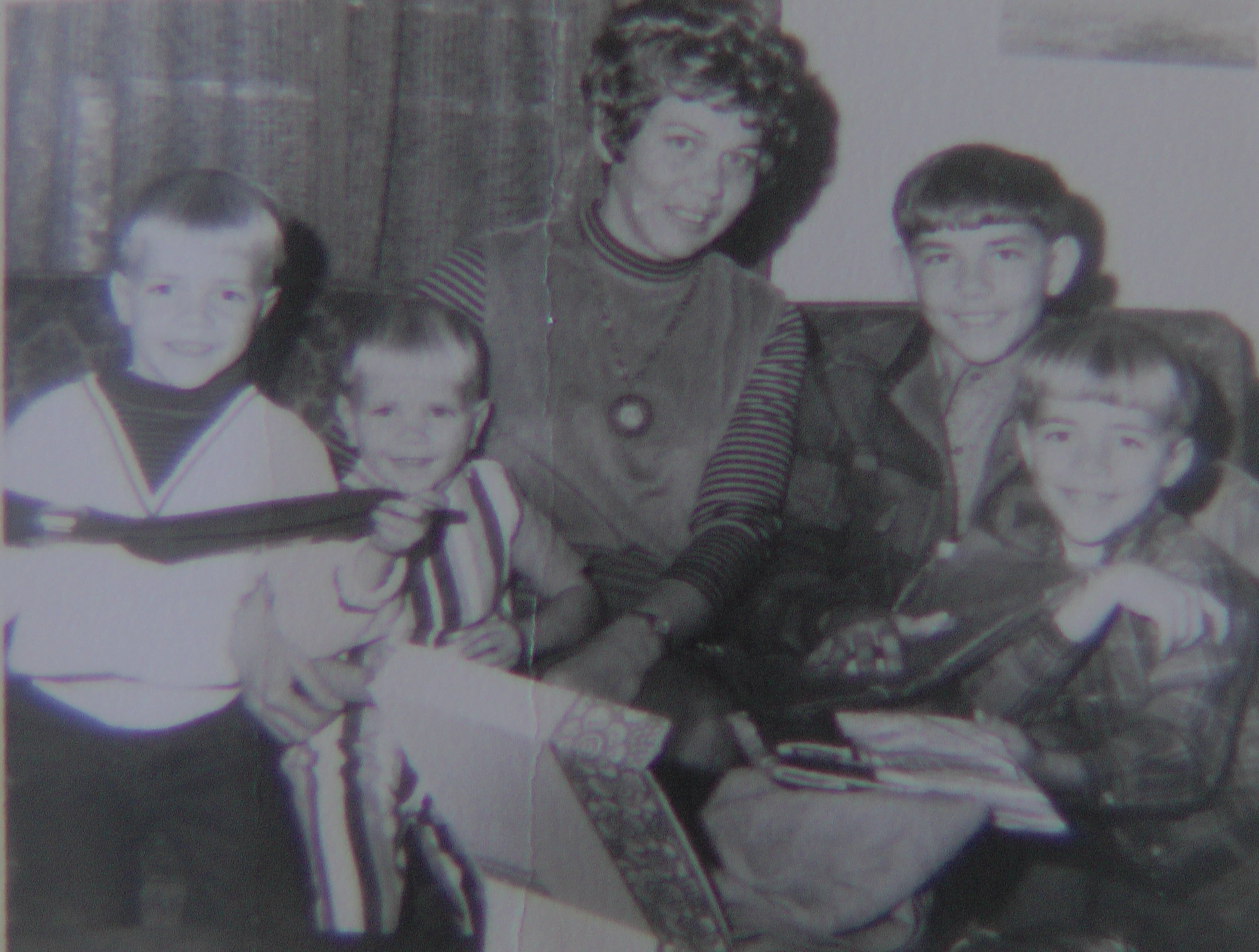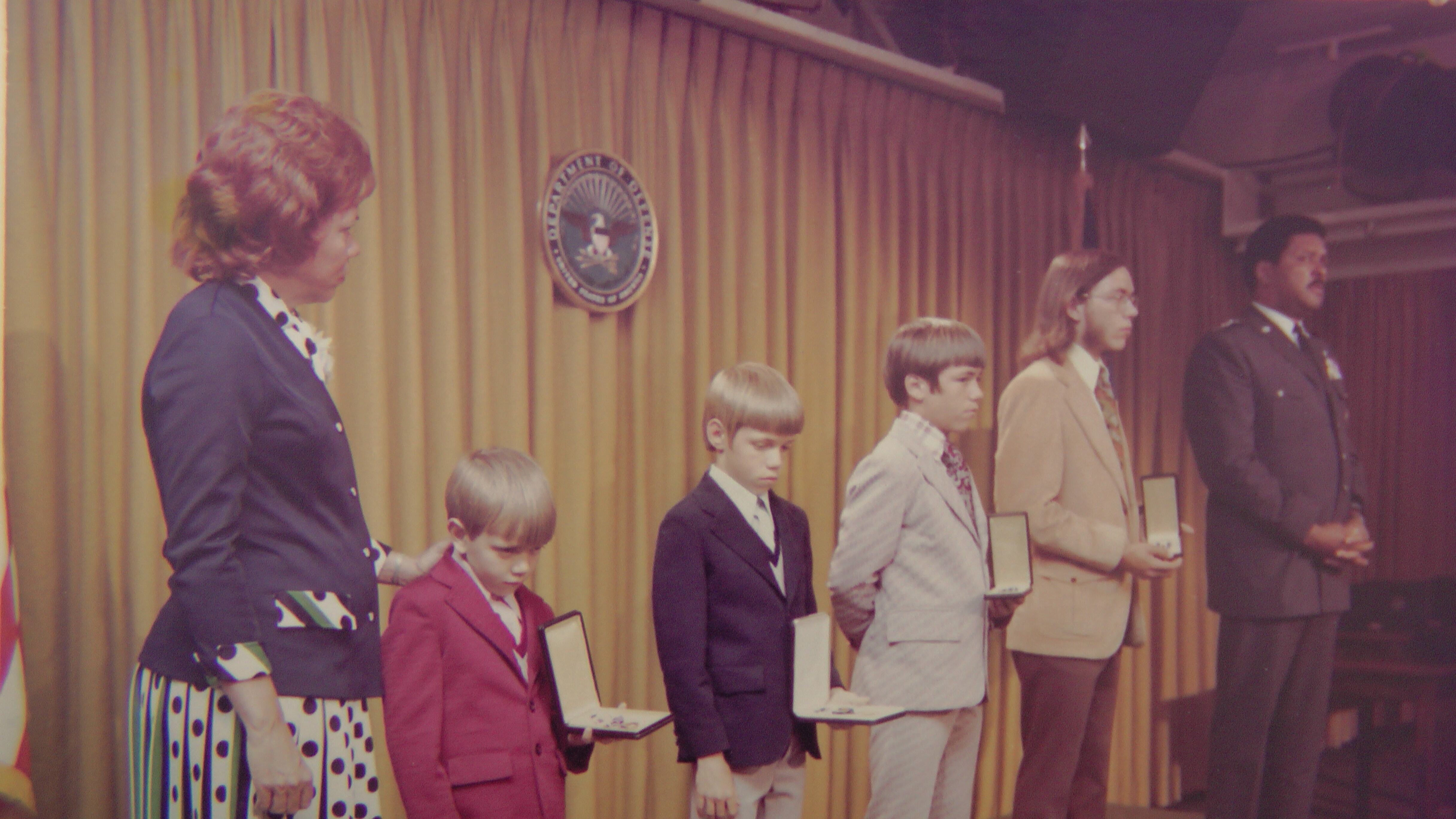On a snowy January day nearly 50 years ago, a Western Union driver delivered the telegram that changed Jeff Grubb's life.
When he retells the story — the unexpected knock at the door of their Central Virginia home, his mother's cries — he feels 9 nine years old again, powerless and shell-shocked by news he Grubb hoped would never come.
His father, Lt. Col. Wilmer Grubb, was missing in action, his reconnaissance plane shot down during a Jan. 26, 1966, mission over North Vietnam.
Left to worry and wonder over his fate for years were his wife, Evelyn, and their four sons, of whom which Jeff Grubb is the eldest. The youngest would be born 180 days after their father went missing.
Now those sons, all in their 50s, will return to Vietnam in April next month in the hope of putting to rest questions that have plagued them for decades.
Days after that fateful knock on the door of their Central Virginia home, North Vietnam released photos of Wilmer Grubb in seemingly fine health, uninjured except for what appeared to be a superficial knee wound. In the most iconic image meant to portray the humane treatment of prisoners of war, the pilot sits on the ground in his uniform while a nurse tends to his knee and a Vietnamese soldier, his gun at the ready, looks on.
Yet when the remains of Wilmer Grubb were at last returned home in 1974, the Vietnamese claimed he'd died nine days after his capture from injuries sustained in the crash.
It was a story his wife, Evelyn, who died in 2005, never believed.
"We want to see what answers we can come up with," said Jeff Grubb, who now lives in California and works as a librarian. "For so long, we could only imagine the places, could only imagine what happened to our father."

Evelyn Grubb with sons (from left) Stephen, Roy, Jeff and Roland around 1968, prepare a package to mail to Lt. Col. Wilmer Grubb, who they believed was being held as a POW. He had in fact already died.
Photo Credit: Courtesy of Grubb family
The Grubb brothers — Jeff, Roland, Stephen and Roy — are traveling to Asia at the unexpected invitation of a Vietnamese solider involved in bringing down their father's plane and his subsequent capture.
Roy will bring his son along for the journey.
An independent film company, Napkin Sketch Productions, will document their travels as part of a feature-length documentary called "Fruits of Peace" that will be available in early 2016.
"I don't know that there will be full closure," Jeff Grubb said. "Fifty years have gone by here. The doors are closing, the people who know things are getting older."
But the family believes it is their last best chance.
Born to fly
As the eldest, Jeff Grubb remembers the most about his father. He remembers trips around Europe when Wilmer Grubb was stationed with the Air Force in France and in Germany. He remembers fishing trips and camping trips and crabbing on the Maryland shore when the family returned stateside.
He remembers the story of Wilmer Grubb's first flight: He'd been a school boy when he cut class and made his way to the local airport, where he talked a local pilot into taking him up.
"He realized then he absolutely wanted to be a pilot," Jeff Grubb said.
He joined the Air Force in 1955, eventually piloting RF-101C Voodoos.
As 1965 came to a close, Wilmer Grubb prepared to head to Vietnam. His impending departure weighed heavily on the 33-year-old father who was expecting his fourth child.
"He was a highly trained, decorated airman recognized as a great reconnaissance pilot," Jeff Grubb said. "His country had called and he was going away."
There was more than a foot of snow on the ground the day the Western Union truck showed up. Which made the knock at the door all the more ominous. Evelyn Grubb knew right away the news was bad.
"She started screaming, 'Go away, go away.' And of course, the news wouldn't go away," Jeff Grubb said.
Wilmer Grubb had been flying an unarmed reconnaissance mission when he came under fire from a North Vietnamese anti-aircraft gun unit in Quang Binh.
The Grubb family did not know whether he had survived the crash until the North Vietnamese photographs emerged, appearing in publications around the world. In the most iconic image meant to portray the humane treatment of prisoners of war POWs, the pilot sits on the ground in his uniform while a nurse tends to his knee and a Vietnamese soldier, his gun at the ready, looks on.
"It indicated to us he had been captured and had survived the crash and was in good health," Jeff Grubb said.
The family was filled with hope. "We tried to abide by the restrictions placed on mailing packages to prisoners." of war.
But years went by with no reply — and no update as to what had become of their father.
"Many years later, we were informed he was officially listed as dead, not captive," Jeff Grubb he said.
Wilmer Grubb had presumably died within days of his capture at the infamous prison camp Hỏa Lò Prison, long referred to as the "Hanoi Hilton" by Americans who survived it.
His remains were returned to the family and interred at Arlington National Cemetery in 1974, more than eight years after his capture.
Family's new mission
The years of uncertainty transformed the lives of Evelyn Grubb and her four sons.
A stay-at-home mother at the time her husband disappeared, Evelyn Grubb became active on the world stage in advancing the plight of families of Vietnam POWs. She served as the national coordinator of the National League of POW/MIA Families in Washington in 1971 and 1972, and had a role in the creation of the league's "You Are Not Forgotten" flag, according to a Washington Post obituary.
"She had the ability to concentrate her grief and then move and act, to not be immobilized by the bad things," Jeff Grubb said. "She talked to anybody who might have access to information or the ability to help the cause or find out information about POWs and MIAs. She talked to heads-of-state, had meetings with [Secretary of State Henry] Kissinger and [President] Nixon and Hell's Angels. Anybody she could talk to, she did it."
Eveyln Grubb co-wrote a book with Carol Jose called "You Are Not Forgotten: A Family's Quest for Truth and the Founding of the National League of Families."

The Grubb brothers "became kind of spokespeople for the [National League of Families] organization," Jeff Grubb says. "We were the token POW kids, so it was important for us to go and speak at Memorial Day services at local cemeteries, to speak to civic groups." Here, Evelyn Grubb and her sons accept posthumous medals in a ceremony at the Pentagon around 1974.
Photo Credit: Courtesy of Grubb family
When his mother traveled in those early years, much responsibility fell to Jeff Grubb.
"Certainly, being the oldest son, it meant that I had to grow up quickly in a lot of ways. We also became kind of spokespeople for the [National League of Families] organization," he said. "We were the token POW kids, so it was important for us to go and speak at Memorial Day services at local cemeteries, to speak to civic groups. I remember speaking at an assembly at my high school. It certainly changed who I might have been, because it really gave us a focus that's quite different than most kids growing up."
Despite those weighty responsibilities, Evelyn Grubb tried to make sure her boys got to do things regular kids did. "She made sure we got summer vacations and went to the beach," Jeff Grubb said. Once, she took them on a trip across the country to Disneyland.
It was their mother's memory the Grubb brothers first considered when they received a letter from the Vietnamese man who said he was involved in the downing of their father's plane.
"We have stories about Grubb," Du Pham wrote. "We hope to provide information to any people that want to know about Grubb and to his family as well. If Grubb's relatives want to visit Vietnam, we will treat them well."
Had Evelyn Grubb been alive to receive the letter, son Stephen Grubb said in interview with the film's producers, she would have hopped the first plane to Vietnam.
Pham, a young officer in the North Vietnamese Army in 1966, vividly recalled bringing down Wilmer Grubb's plane and his subsequent capture. The U.S. airman remained in their custody for about a day before Pham's group turned him over to higher-ranking authorities. At the time, Pham recalled, Wilmer Grubb was alive and well.
When Pham traveled to the U.S. more than four decades later as part of an unrelated documentary by Napkin Sketch Productions, he decided to look up Wilmer Grubb.
"He had every expectation of finding my father alive," Jeff Grubb said.
Pham was shocked to learn that the pilot had not survived the war. He paid his respects to his former enemy during a visit to Arlington National Cemetery, carrying with him a copy of Evelyn Grubb's book.
Back in Vietnam, Pham shared his discovery with his old army buddies, said "Fruits of Peace" co-producer Kevyn Settle. Pham wrote a letter to the Grubb family and asked the filmmakers to deliver it.
"It was very brave of him," Stephen Grubb said in a 10-minute video by the filmmakers, who are raising money for the project on indiegogo.com.
The Grubb brothers plan to retrace their father's final steps and meet with as many people as they can who have some knowledge of their father — including the Vietnamese nurse pictured in the photo tending to Wilmer Grubb's knee.The film producers, with the help of Pham, have located her and others they believe can provide information.
"Maybe we'll open the window and find out what really happened at the end. That's scary," Stephen Grubb, a maintenance engineer for a condominium management company in Florida, said in the Kickstarter video. Yet "facing fear is something we've learned to cope with.
"It's above us. In our family's name, we've got to find any information on what happened after [our father] bailed out of his airplane."
